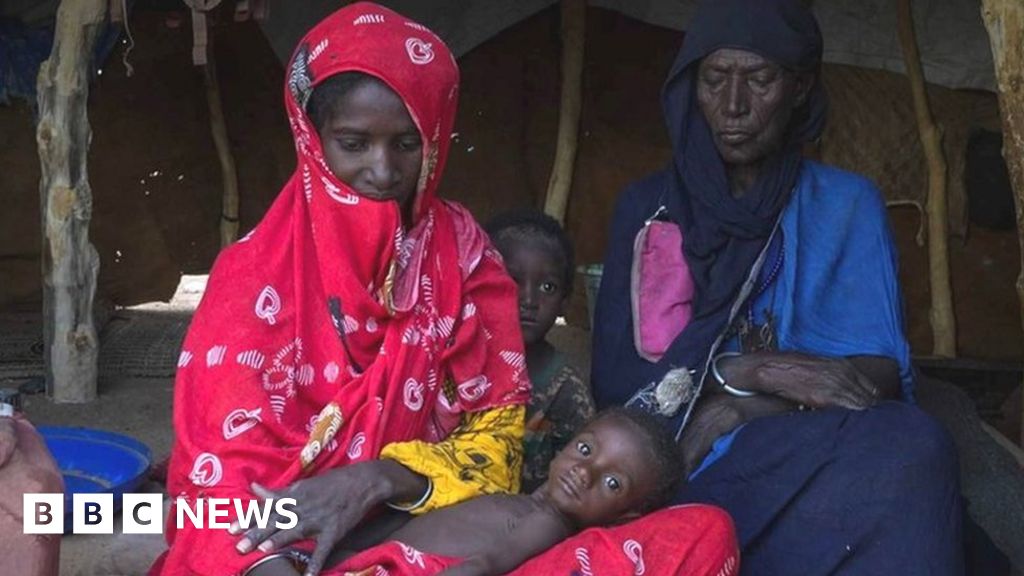As Mali fights Islamist militants and separatists, it has turned to Wagner mercenaries for security. But the group’s leader is now presumed dead, UN peacekeepers are leaving and Mali faces a crisis. The BBC’s Feras Kilani travelled to its dangerous northern desert region - the only international journalist to go there in the past year - to meet people caught up the chaos.
It was late in the evening when we set up camp, lit a fire to cook our dinner and laid down our blankets to sleep under the open sky. Suddenly the silence of the hot desert night was broken by the roar of a motorbike.
Around us we heard a series of clicks as the armed men in our convoy cocked their rifles and machine guns. We were with a group of Tuareg separatists who told the man on the motorbike to move on.
As soon as he left, our hosts told us we had to leave too. Immediately. It was too risky to stay put as the man was a scout for a local group linked to al-Qaeda
We had been careful, swapping our jeans for traditional robes and Tuareg headscarves to blend in, but if he realised foreigners were in the camp he could lead the militants to us and we could be kidnapped.
We packed up as quickly as we could and drove off into the pitch black without any headlights or torches so that we couldn’t be followed.
This part of northern Mali is beyond government control and is run by groups of Tuareg separatists and Islamist extremists linked to al-Qaeda - they don’t exactly get along but they have reached a mutual understanding to leave each other alone. But the tension and fear we experienced that night reflects a deepening crisis across the country as it slides deeper into lawlessness and chaos.
The government has turned away from international peacekeeping forces, relying on Russia’s Wagner group for security instead. But now the mercenaries’ notorious leader, Yevgeny Prigozhin, is believed to have died in a plane crash, leaving questions over operations here and fears that Mali is in an even more precarious position
Further to the east, the Islamic State group has established itself and is trying to increase the area it controls. We wanted to meet the civilians caught up in the violence IS fighters have brought with them. So we drove more than 1,000km (650 miles) through the desert to the city of Kidal in the east of Mali. When we arrived, we saw camps where thousands of refugees are living after fleeing their homes.
“Islamic State forced us to come here,” Fatima told us, sitting on the floor of a makeshift tent - a rough piece of material propped up by a few branches. She is in her 60s and this is now her home, with her daughter and two of her grandchildren by her side.
Her husband and son-in-law were killed when IS attacked the village where they used to live.
“They killed all our men and burned all our food and animals,” she added. Others told us similar stories of how their supplies of grain, sheep and camels had been destroyed, leaving them with nothing. Many of the youngest children we saw had no clothes or shoes
Fatima, and what remains of her family, walked hundreds of kilometres to reach Kidal from her old home in Menaka state in eastern Mali.
As we had seen for ourselves, travelling across the desert is tough. There are no paved roads, just rough routes marked in the sand by vehicles that have passed through before. The sand stretches as far as you can see, sometimes dotted with trees and shrubs.
There’s not much for people in Kidal, but at least they can survive. “We found water and shelter, so we stayed,” Fatima said. People in these camps get some basic assistance from local NGOs but there isn’t much.
We also met Musa Ag Taher, one of the few men in the camp. Islamic State fighters attacked his home too. “When IS entered the town I buried myself until they left and then I managed to escape with my family,” he said. He described how he dug a shallow pit in the ground and covered himself with sand to hide. He managed to escape with his four children
This is the best summary I could come up with:
The BBC’s Feras Kilani travelled to its dangerous northern desert region - the only international journalist to go there in the past year - to meet people caught up the chaos.
This part of northern Mali is beyond government control and is run by groups of Tuareg separatists and Islamist extremists linked to al-Qaeda - they don’t exactly get along but they have reached a mutual understanding to leave each other alone.
But now the mercenaries’ notorious leader, Yevgeny Prigozhin, is believed to have died in a plane crash, leaving questions over operations here and fears that Mali is in an even more precarious position.
And earlier this year, the UN accused Wagner of committing atrocities alongside the Malian army, describing “alarming accounts of horrific executions, mass graves, acts of torture, rape and sexual violence” in the Mopti area.
The BBC has not been able to verify where the video was filmed, but in it, Prigozhin said the group was making Africa “more free” and that Wagner was exploring for minerals as well as fighting Islamist militants and other criminals.
But with hundreds of sites like this across the country, Mali manages to produce more than 60 tonnes of gold a year, making it one of Africa’s top five exporters of the precious metal.
The original article contains 1,664 words, the summary contains 214 words. Saved 87%. I’m a bot and I’m open source!



